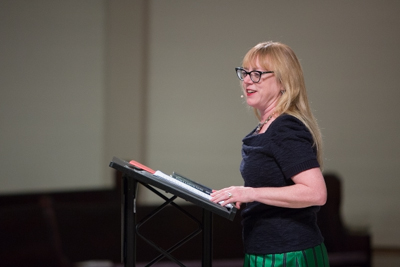Karen Swallow Prior Lectures at SEBTS on Fierce Convictions
January 19, 2017

 Karen Swallow Prior lectured on “Fierce Convictions” at the inaugural event of The Center for Spiritual Formation and Evangelical Spirituality directed by Nathan Finn.
Karen Swallow Prior lectured on “Fierce Convictions” at the inaugural event of The Center for Spiritual Formation and Evangelical Spirituality directed by Nathan Finn.
Prior is a professor of English at Liberty University and a research fellow with the Ethics and Religious Liberty Commission of the Southern Baptist Convention. She is the author of “Booked: Literature in the Soul of Me” and “Fierce Convictions: The Extraordinary Life of Hannah More – Post, Reformer, Abolitionst.” She and her husband live in Amherst, Virginia.
On Tuesday, April 7 Prior delivered a lecture to Ph.D. students followed by an evening talk open to the public held at Wake Forest Baptist Church.
Prior’s afternoon lecture was titled “Why Theologians Should Read Classic Literature.”
“I thought my love of books was taking me away from God,” Prior said. “As it turns out, books were the backwoods path back to God.”
Prior shared about how books filled her childhood. “Books made my world feel bigger and made me feel freer,” she said. “The way we read can be more important that what we read.”
Prior encouraged listeners to realize the value of reading a variety of works. She believes that the truth will be known in the midst of falsehood. “The God I had been raised to believe in was not a God of record burning and book blotting, but a God of freedom,” she said. “You will know the truth, and the truth will set you free.”
“The fact was that there was no essential conflict between the tenets of my faith and freedom of the mind,” she said. “The oppression I had felt in the church was of human origin, not divine.”
She continued to focus on the connection between God and one’s intelligence. “Wisdom considers not only what a book says but how it says it,” she said. “God expects us to exercise reason and virtue.”
“Reading is one of the few distinctively human activities that sets us apart from the rest of the animal kingdom,” she said. “It must be taught. Because it goes beyond mere biology, there is something profoundly spiritual — however one understands that word — about the human ability, and impulse, to read.”
“The books I have read over a lifetime have shaped my worldview, my beliefs, and my life as much as anything else,” she added.
In the evening, Prior addressed the 200 attendees about her book about Hannah More’s “fierce convictions” as she engaged popular culture in the 18th and19th century.
Prior spoke about how More influenced society by revealing the horrors of the slave trade. She used tracts to create awareness of slavery’s negative aspects.
“England was awash in a sea of pamphlets, the seventeenth- and eighteenth-century equivalent to today’s blog posts: quick and cheap to produce and easy to circulate,” she said.
In order to change the mind of Parliament about the slave trade, More realized that she would first have to change the peoples’ perspective. Her abolitionist efforts were some of the first propaganda campaigns seeking to influence public opinion.
“The tracts were politically and religiously conservative but socially liberal,” Prior said. “They supported traditional hierarchies and work ethics, yet empowered the poor in arguably radical ways by providing reading material that improved literacy with the use of elevated language accessible to readers.
The tracts became very popular in London since they combined entertainment and instruction. The tracts’ timing made them applicable to poor classes who were becoming literate.
“The tracts included not only lessons in morality and religion but also recipes, thrifty hints, and tips for self-improvement,” she said.
For example, the last section of “The Cottage Cook,” tract was a list of friendly hints calling readers to, “Pay your debts, serve God, love your neighbor.”
The tracts included cover art, engaging titles and were “simple, substantive and fun,” Prior said.
Military troops and upper class citizens also began to read versions of the tracts.
The 2 million tracts were issued for 3.5 years, and More wrote about half of the 100 editions and supervised all production.
In 1833, More died at the age of 88 as a well-known influencer of her day.
The Center for Spiritual Formation and Evangelical Spirituality plans to host additional events in the coming months. The mission of the center is to promote spiritual maturity and the cultivation of a robust evangelical spirituality for the glory of God, the health of the church and the advancement of Christian mission. It’s director, Nathan Finn, is also an associate professor of historical theology and Baptist studies at SEBTS.
To view photos from these events, please click here.